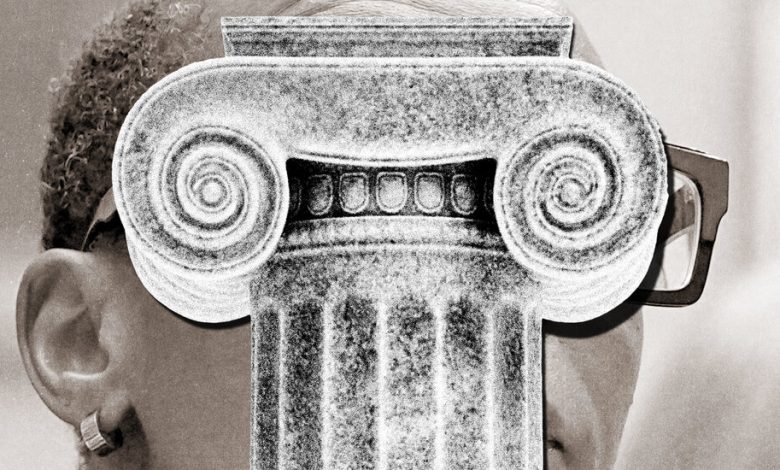The Claudine Gay Debacle Was Never About Merit

Claudine Gay’s resignation this week as Harvard University’s president marks the end of a shameful chapter for the institution. The debacle’s architects promise to make America’s elite institutions great again. They say they pushed out Dr. Gay and, nearly a month ago, the University of Pennsylvania’s president as a warning to the nation’s cultural institutions. How they will continue to wield their influence and if they will succeed depends on how willing we all are to keep buying age-old ideas about merit from power-hungry peddlers.
Dr. Gay’s resignation comes nearly a month after the presidents of M.I.T., Harvard and the University of Pennsylvania testified before Congress. (Columbia University was also invited. It declined. As the kids say, Columbia understood the assignment.) These particular schools were chosen not because of their academic bona fides but because of their cultural significance. Yes, Harvard, Penn and M.I.T. boast highly selective admissions and lauded faculty. But they are also institutions with strong international brands built on prestige, history and the perception of excellence. A hearing ostensibly about antisemitism on campus quickly became little more than a coordinated political spectacle about power.
You do not have to take my word for it. You can believe Chris Rufo, a conservative activist who was one of the architects of the debacle, who celebrated on X this week for having “SCALPED” Dr. Gay. Distinct from the campaign waged against Penn’s former president Elizabeth Magill, the attacks against Dr. Gay have been cut from whole cloth, from a historical narrative about merit and diversity that is a hallmark of America’s higher-education prestige hierarchy.
Rufo explained his plan for ginning up controversy about higher education’s most prestigious universities in an interview on the heels of Dr. Gay’s resignation, explaining that it was a coordinated, strategic attack that used narrative, financial and political leverage. His partners included members of Congress, wealthy donors, journalists, media and a bloodthirsty audience. Riding high on success, Rufo said his strategy could push the conservative movement back into what he considers its rightful place: the top of America’s most powerful cultural institutions.
The three legs of Rufo’s strategic stool are basic organizing tools — creating a message, attracting financial patronage and forging political alliances. It is notable that he can pull these levers. But that may say more about our times than about Rufo himself. The financial donors who wanted to exert control had the money and political will. The politicians have been freed from the shackles of voters who would penalize them for bad behavior. If there is any real strategy at work here, it is the message the Rufo team created. He gives credit to conservative journalists like Christopher Brunet and Aaron Sibirium. The message interpolates several old tropes into a liberal-sounding message about merit.
Rufo says he smuggled a narrative into “the left-wing media.” That narrative rests on a critical discursive link — D.E.I. is synonymous with “lacking merit.” It is a neat trick. Harvard’s endowment has been valued at nearly $50 billion. Yet the Rufo messaging strategy successfully painted the institution’s president as an undeserving beneficiary, even if she is not.
The specter of D.E.I. made her presidency sound like a voucher program for a welfare recipient and not the internal promotion of a long-term employee to leadership. When you hear someone from the reactionary crowd talk about D.E.I.’s undue influence over an institution like Harvard, he sounds like a royal who finds himself forced to go to the D.M.V. for the first time. Subjected to rules designed for hoi polloi, forced into lines with people who need the government and unable to buy his way out of it. It is not genius. It is a powerful rhetorical strategy because it merged the political craftsmanship of the 1988 Willie Horton ad with the moralism of federalism.
It plays on the latent but powerful idea that government — big government — unfairly helps undeserving people, many of them women and people of color, who drain the pool of opportunity for deserving people. D.E.I. is “bad” because it supplants merit for diversity and it empowers the racialized federal government to stick its hands into an institution that produces the cultural elite. That made Harvard a public problem. The public proved all too willing to weigh in on whether a tenured professor deserved her job, with its role, status and ranking. Once this link was secured, every other charge became stickier.
Rufo wants to be certain that he gets credit. That is a lot of ego talking, but he may have a point. Despite his broadcasting his plans on X, laying out his strategy like a cartoon villain and claiming victory to anyone who will listen, some people still want to find more genteel explanations. Conservative commentators blame diversity itself for the Harvard debacle, arguing that a “social justice model” of higher education has supplanted a merit model at our nation’s colleges and universities. It is most galling at the most prestigious institutions, where status granted without concern for merit breeds resentment. Consequently, academic rigor and culture have receded from Western civilization’s high-water mark.
It is a popular idea. Some scholars believe it. A lot of the alt-right believes it. Regular people complaining about someone getting into college when they did not “deserve” to, they believe it. The underlying belief is noxious. It presumes diversity and merit are mutually exclusive. Beyond that, whether higher education is less meritorious now than it was in some unspecified past cannot be measured.
That is because merit, itself, cannot be defined. That is why the concept is so useful for slippery slopes. It cannot be proved or disproved. It can only be argued.
Academicians and practitioners know that you cannot operationalize merit. But historians know that there is powerful evidence about merit in the archives of our nation’s elite institutions. Whenever politicians, activists and investors agree that there is a merit crisis at Harvard, it signals that a battle rages, not over rigor, but over power.
In the 1880s, Harvard was willing to train a small group of women in art, literature and philosophy. But there were limits. Class and race, obviously. But also a limit on just how legitimate this training was when pursued by the female sex. Some worried that educating women could corrupt their natural talents and that coeducational learning could compromise character development for men and women.
In the 1920s, Harvard (along with Yale and Princeton) were dismayed that so many Jewish students were passing its carefully designed admissions tests. The institutions set out to revise those tests to account for all manner of cultural and physical attributes to filter out those Jewish students. The tests included questions about “character” that amounted to a litmus test for race and ethnicity. Jerome Karabel, in his book “The Chosen,” shows this redefinition of merit at Harvard, Yale and Princeton over and over again as elite institutions fight not to defend rigor but to maintain their hold on status amid social changes in America.
Wave after wave of immigrants, minorities and other socially mobile groups of people in the United States have experienced a similar story with Harvard. Each successive fight for the university’s soul was cloaked in language about merit. Well-meaning scolds worried about immigrants’ test scores or poor students’ cultural fit or whether women could do math. Every time, the moral case for “diversity” must contend with the supposedly rational case for “merit” or achievement. There are often religious overtones, harking back to America’s manifest destiny; it’s as if the country will dissolve into a failed state if merit’s clerics do not defend its virtues.
All of this dichotomous thinking forgets one thing: Academics are not born; they’re made. More broadly, administrators of Harvard, or anywhere else for that matter, are not born; they are made. They are promoted and trained. Surely, Harvard can train a bureaucrat.
Of course Harvard can train a bureaucrat. It trains the world’s leaders. It also runs the Harvard Seminar for New Presidents, which trains university presidents. It is part of academic leadership culture and the administrative industry that has grown around higher education.
What I have found particularly interesting (if not a little shocking) about this whole affair is that Dr. Gay’s promotion to president is so utterly normal. Rufo has described her scholarship record as “thin,” but university leadership has been professionalized for at least two decades. Competitive programs recruit and train cohorts of early-career scholars to prepare them to become provosts and presidents. Beyond that, “nontraditional” university presidents are highly prized in the modern university. University boards view them as market-friendly and business-savvy.
As has happened historically, Dr. Gay’s detractors redefined merit to mean whatever they wanted it to mean, in practice turning bureaucratic minutiae into a political bomb. Joseph McCarthy could only have wished for the networked media power that today’s reactionary power-seekers possess. The speed, scale and amplification of the power to capture an aspect of routine workaday life and cast it as nefarious activity is staggering. What has happened at Harvard is not just a blueprint for taking over higher education; it is a strategy for taking over our information environment.
I don’t like to argue about the human resources problems of rich private colleges. But love them or hate them, the Ivies set the Overton window for a lot of higher education. Colleges without Harvard’s media spotlight and billions of dollars are more vulnerable. Countless mobilized reactionary groups have more media attention than they have organic audience. They know how to capture media, court financial donors and form political alliances. They do not need a wide community of adherents to make themselves look like a movement.
If you like Rufo’s vision of a status hierarchy, in which merit is whatever the winner says it is, then he’s your man. In his vision for the New College of Florida, liberal arts has been diminished, gender studies has been marginalized and merit — whatever that means — trumps social justice. Harvard can buttress the consequences with prestige and money. The rest of higher education will find it harder. Networked, nationalized and emboldened, Rufo has nothing standing in his way. If Florida feels like the future you desire, you are in luck. Florida’s architects are winning.
Tressie McMillan Cottom (@tressiemcphd) became a New York Times Opinion columnist in 2022. She is an associate professor at the University of North Carolina at Chapel Hill School of Information and Library Science, the author of “Thick: And Other Essays” and a 2020 MacArthur fellow.
Source images by Ken Cedeno/Reuters and 3drenderings/Getty Images
The Times is committed to publishing a diversity of letters to the editor. We’d like to hear what you think about this or any of our articles. Here are some tips. And here’s our email: [email protected].
Follow the New York Times Opinion section on Facebook, Instagram, TikTok, X and Threads.



